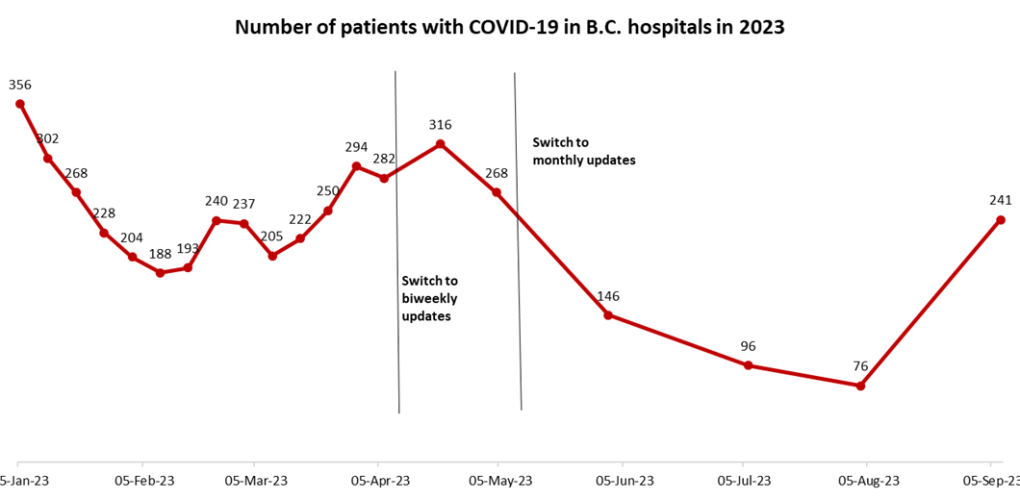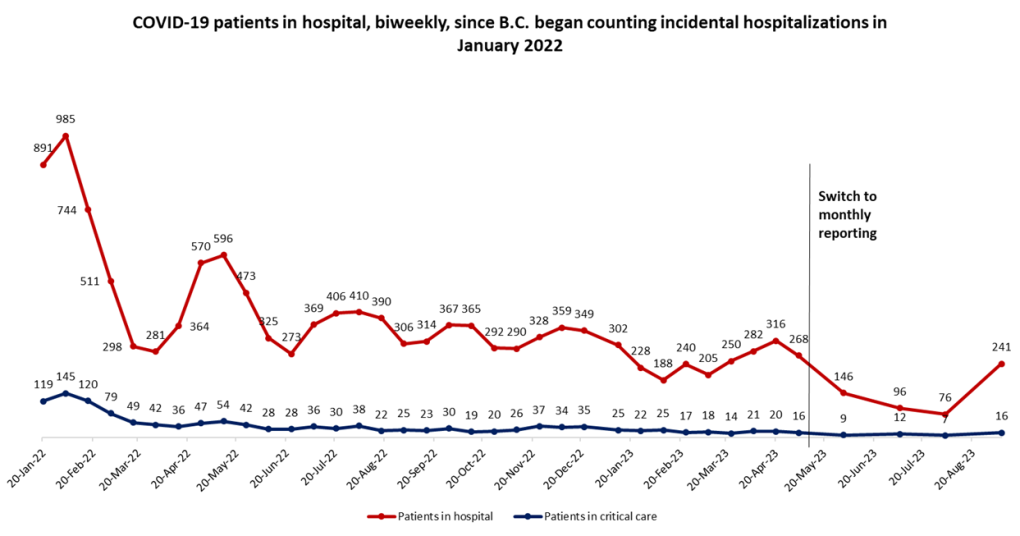B.C. COVID-19 data: Number in hospital triples in a month
The number of COVID-positive patients in B.C. hospitals has more than tripled in the last month, according to the latest data from the B.C. Centre for Disease Control.
As of Thursday, there were 241 test-positive patients in hospitals around the province, up from a two-year low of just 76 at the start of August.
Thursday's total is the highest since May 4, when the BCCDC reported 268 people in hospital with COVID-19.
 The number of people in hospital with COVID-19 in B.C. in 2023, as reported by the B.C. Centre for Disease Control, is shown.
The number of people in hospital with COVID-19 in B.C. in 2023, as reported by the B.C. Centre for Disease Control, is shown.
The latest update comes after the province became the first in Canada to identify a local case of the BA.2.86 variant, which has some mutations that "raise an eyebrow," according to Dr. Isaac Bogoch, a Toronto-based infectious disease expert, who spoke to CTVNews.ca about the variant.
Thursday's data also follows a surge in SARS-CoV-2 concentrations in B.C. wastewater, monitoring data for which is still published weekly.
In its notes on the latest numbers, the BCCDC says no additional samples of the BA.2.86 variant have been found in the province's whole genome sequencing.
Most of the infections seen in the province in recent weeks have been either the EG.5 or XBB.1.16 variants, according to the BCCDC.
All of these various lineages are still considered versions of the Omicron variant that became the dominant strain in late 2021.
The 241 people in hospital with COVID-19 in B.C. as of Thursday is the highest total seen in months, but still a relatively low number compared to the totals seen throughout 2022.
 The number of people with COVID-19 in B.C. hospitals since the province switched to a "hospital census" model for counting them in January 2022 is shown.
The number of people with COVID-19 in B.C. hospitals since the province switched to a "hospital census" model for counting them in January 2022 is shown.
Figures shown on the graphs in this article include all test-positive COVID patients reported in B.C. hospitals on the corresponding dates, regardless of whether their COVID infection was the reason for their hospitalization.
This means that some of the people included in the count – between 50 and 60 per cent according to health officials – do not have serious cases of COVID-19, but rather tested positive incidentally while they were in the hospital for other reasons.
However, the BCCDC also acknowledges that its counting of hospitalizations – particularly weekly hospital admissions, which are different from the number of people currently hospitalized – is designed for rapid surveillance rather than a thorough examination of the burden of COVID-19 on the health-care system.
Last month, the Canadian Institute for Health Information released data showing thousands more hospitalizations in B.C. between April 2022 and April 2023 than the BCCDC's system reported during the same time period.
Neither agency said the other's numbers were wrong, and both said the counting methods are different and not directly comparable.
CTVNews.ca Top Stories

opinion Tom Mulcair: Prime Minister Justin Trudeau's train wreck of a final act
In his latest column for CTVNews.ca, former NDP leader and political analyst Tom Mulcair puts a spotlight on the 'spectacular failure' of Prime Minister Justin Trudeau's final act on the political stage.
B.C. mayor gets calls from across Canada about 'crazy' plan to recruit doctors
A British Columbia community's "out-of-the-box" plan to ease its family doctor shortage by hiring physicians as city employees is sparking interest from across Canada, says Colwood Mayor Doug Kobayashi.
'There’s no support': Domestic abuse survivor shares difficulties leaving her relationship
An Edmonton woman who tried to flee an abusive relationship ended up back where she started in part due to a lack of shelter space.
opinion King Charles' Christmas: Who's in and who's out this year?
Christmas 2024 is set to be a Christmas like no other for the Royal Family, says royal commentator Afua Hagan. King Charles III has initiated the most important and significant transformation of royal Christmas celebrations in decades.
Baseball Hall of Famer Rickey Henderson dead at 65, reports say
Rickey Henderson, a Baseball Hall of Famer and Major League Baseball’s all-time stolen bases leader, is dead at 65, according to multiple reports.
Arizona third-grader saves choking friend
An Arizona third-grader is being recognized by his local fire department after saving a friend from choking.
Germans mourn the 5 killed and 200 injured in the apparent attack on a Christmas market
Germans on Saturday mourned the victims of an apparent attack in which authorities say a doctor drove into a busy outdoor Christmas market, killing five people, injuring 200 others and shaking the public’s sense of security at what would otherwise be a time of joy.
Blake Lively accuses 'It Ends With Us' director Justin Baldoni of harassment and smear campaign
Blake Lively has accused her 'It Ends With Us' director and co-star Justin Baldoni of sexual harassment on the set of the movie and a subsequent effort to “destroy' her reputation in a legal complaint.
Oysters distributed in B.C., Alberta, Ontario recalled for norovirus contamination
The Canadian Food Inspection Agency has issued a recall due to possible norovirus contamination of certain oysters distributed in British Columbia, Alberta and Ontario.

































